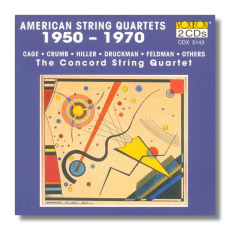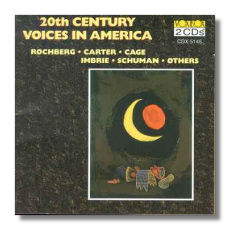
The Internet's Premier Classical Music Source
Related Links
- Latest Reviews
- More Reviews
-
By Composer
-
Collections
DVD & Blu-ray
Books
Concert Reviews
Articles/Interviews
Software
Audio
Search Amazon
Recommended Links
Site News
 CD Review
CD Review
Twentieth-Century Music

American String Quartets 1950-1970
- Stefan Wolpe: String Quartet (1969)
- Earle Brown: String Quartet (1965)
- John Cage: String Quartet in Four Parts (1950)
- Leon Kirchner: Quartet #3 for String Quartet and Electronic Tape (1967)
- Christian Wolff: "Summer" (1961)
- George Crumb: "Black Angels" (1970)
- Lejaren Hiller: String Quartet #5 (in Quarter-tones) (1962)
- Jacob Druckman: String Quartet #2 (1966)
- Morton Feldman: "Structures" for String Quartet (1951)
The Concord String Quartet
(Mark Sokol, Andrew Cummings, violins;
John Kochanowski, viola; Norman Fischer, cello)
VoxBox CDX5143 A?D 2CDs 74:11, 74:33


20th-Century Voices In America
- George Rochberg:
- Tableaux, Sound Pictures from "The Silver Talons of Piero Kostrov"
- String Quartet #2
- George Crumb: Madrigals
- John Cage: The Wonderful Widow of Eighteen Springs
- Elliott Carter: Tell Me Where is Fancy Bred
- William Schuman: Orpheus With his Lute
- Andrew Imbrie: Tell Me Where is Fancy Bred
- Harold Blumenfeld: Rilke
- Gregg Smith: Steps
- Barbara Kolb: The Sentences
- Shalimut Ran: "O, the Chimneys"
Jan De Gaetani, Elizabeth Suderberg,
Rosalind Rees & Phyllis Bryn-Julson, singers
David Starobin, guitar
VoxBox CDX5145 A?D 2CDs 65:50, 64:12
First, there were plenty of bargain CDs of music in the standard repertoire. Next, Naxos came along and started making less familiar music available at lunch hour prices. However, budget labels have largely ignored modern classical music, which is why these two VoxBoxes are so unusual and valuable. Both were recorded between 1972 and 1976, and most of the recordings are by the team of Marc Aubort and Joanna Nickrenz at Elite Recordings – a guarantee of high sonic values.
The Concord String Quartet yields nothing to the competition. The Kronos Quartet recorded George Crumb's Black Angels several years ago, and confrontational as the Kronos's reading is, the Concord String Quartet's more expansive reading (more haunting, less horrifying) is even better. Similarly, the LaSalle Quartet's recording of John Cage's String Quartet in Four Parts, while paced almost the same as the CSQ's, shows that the group is not as sensitive to the composer's requests for unusual string timbres. Some of the other works on this disc are souvenirs of times gone by. Kirchner's quartet incorporates plenty of sounds from the Bloopity-Bleep School of Electronic Music (a school no doubt founded by the Krell from "Forbidden Planet"), and Druckman's quartet is an arid memento of what was going on in academia in the mid-1960s. Still, most of the works in this set are enjoyable, and you don't have to be an expert on modern music (or a rocket scientist) to enjoy them. Composer Lejaren Hiller's original notes accompany this release. They include an entertaining gaffe: "The basic plan of [Druckman's] one-movement string quartet is revealed in the little sketch shown below," which isn't shown, in spite of a note that says, "ed: don't forget to include sketch." Oops!
"20th-century Voices in America" looks like it could have been released on Bridge Records: it includes three of that label's favorite composers (George Crumb, Elliott Carter, and Shulamit Ran), one of its favorite singers (the late Jan De Gaetani), and Bridge Records's president David Starobin playing the guitar. Fortunately, it also sounds like the work of Bridge Records. These are high-quality performances of some very interesting (albeit challenging) music for voice with solo guitar or small ensemble; most of it has not been recorded elsewhere. Highlights include George Rochberg's humanistic progression from the Second String Quartet (1959-61) to Tableaux (1968), and Gregg Smith's setting of Frank O'Hara's outrageous "Steps." Texts and intelligent program notes are included.
There is nothing cheap about these sets, except for their price-tags.
Copyright © 1998, Raymond Tuttle


















